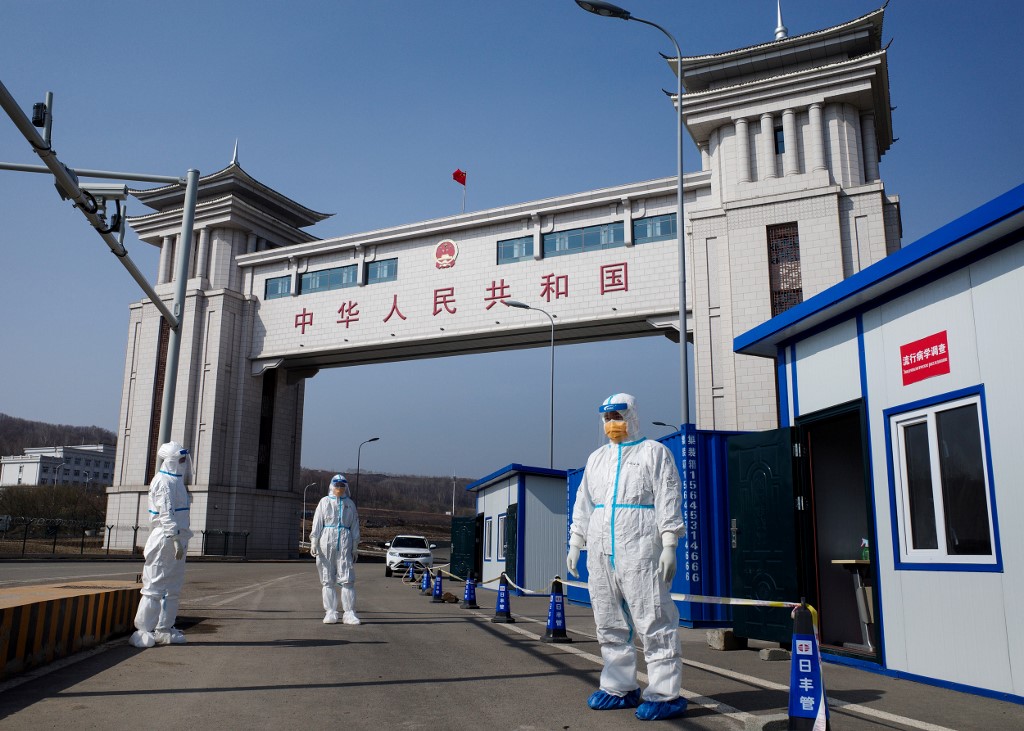US accuses China, Russia of coordinating on coronavirus conspiracies

This photo taken on May 1, 2020 shows staff wearing hazmat suits as a precaution against the COVID-19 coronavirus waiting to check a truck at a customs checkpoint on the border with Russia at Suifenhe, in China’s northeast Heilongjiang province. (Photo by STR / AFP) / China OUT
The United States on Friday accused China and Russia of stepping up cooperation to spread false narratives over the coronavirus pandemic, saying Beijing was increasingly adopting techniques honed by Moscow.
“Even before the COVID-19 crisis we assessed a certain level of coordination between Russia and the PRC in the realm of propaganda,” said Lea Gabrielle, coordinator of the State Department’s Global Engagement Center, which tracks foreign propaganda.
“But with this pandemic the cooperation has accelerated rapidly,” she told reporters.
“We see this convergence as a result of what we consider to be pragmatism between the two actors who want to shape public understanding of the COVID pandemic for their own purposes,” she said.
The Global Engagement Center earlier said thousands of Russian-linked social media accounts were spreading conspiracies about the pandemic, including charging that the virus first detected last year in the Chinese metropolis of Wuhan was created by the United States.
Article continues after this advertisementChina outraged the United States when a foreign ministry spokesman tweeted a conspiracy that the US military brought the virus to Wuhan, but the two countries reached an informal rhetorical truce in late March after telephone talks between President Donald Trump and his counterpart Xi Jinping.
Article continues after this advertisementTensions have again soared as Secretary of State Mike Pompeo pushes the theory that the virus originated in a Wuhan laboratory, a stance that Beijing in turn calls disinformation.
Both the World Health Organization and the US government’s top epidemiologist say there is no evidence the virus came from a lab, with most scientists saying it emerged at a Wuhan meat market that butchered exotic animals.
China’s ambassador to the United States, Cui Tiankai, recently bemoaned what he said was an effort to brand “objective facts as disinformation and propaganda.”
“Behind the mind-set of ‘always blame China’ is a kind of dirty politics, championed by a few people who shift the spotlight for political gain,” Cui wrote in The Washington Post.
Xi on Friday discussed cooperation over the pandemic in a telephone call with Russian President Vladimir Putin.
Russia “opposes the attempts by some forces to use the epidemic as a pretext to blame China and will stand firmly by China’s side,” Putin told him, according to China’s state-run Xinhua news agency.
China and Russia often find common cause and clash with the United States on issues from Venezuela to the use of economic sanctions to disarmament.
Suspicious rise in Twitter followers
According to the Global Engagement Center, China has again intensified its online campaign to defend its handling of the pandemic, which has killed some 270,000 people worldwide, and criticize the United States.
“Beijing is adapting in real time and increasingly using techniques that have long been employed by Moscow,” Gabrielle said.
China has increasingly used bot networks to amplify its message, Gabrielle said.
She said that official Chinese diplomatic Twitter accounts suddenly witnessed a surge in late March, going from adding around 30 new followers daily to more than 720, often from freshly created accounts.
She said China was first observed using such online methods to “sow political discord” in its autonomous territory of Hong Kong, which has witnessed major pro-democracy demonstrations.
Gabrielle said Russia and China found a “convergence of narratives” on the coronavirus, although it was not possible to know the extent of coordination.
“I think there are some examples where we have basically seen a narrative pushed out by a state actor then repeated by another one,” she said.
“So we’re certainly seeing them bounce off of each other and essentially play together in the information space.”
For more news about the novel coronavirus click here.
What you need to know about Coronavirus.
For more information on COVID-19, call the DOH Hotline: (02) 86517800 local 1149/1150.
The Inquirer Foundation supports our healthcare frontliners and is still accepting cash donations to be deposited at Banco de Oro (BDO) current account #007960018860 or donate through PayMaya using this link.